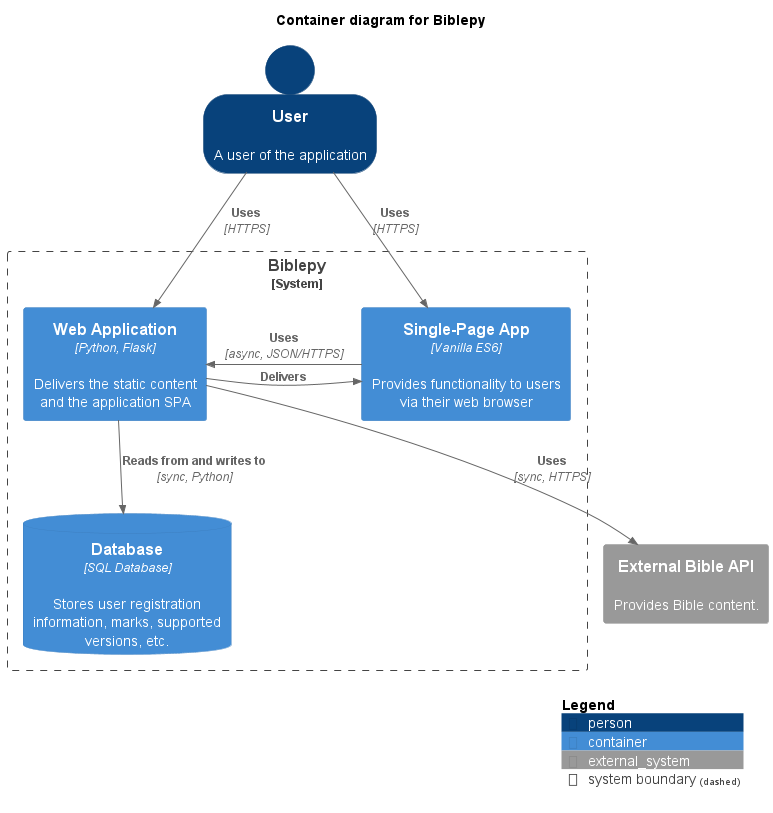Biblemark is a web application designed to enhance your Bible reading experience by allowing you to engage with the text through highlights and notes. This is my final project for the CS50's Introduction to Computer Science course, which I participated as a student in the more comfortable category.
Check out a quick demo on YouTube: Watch Demo
There are numerous Bible versions that vary in language and also in structure. Each version comprises a collection of books, historically organized into chapters and verses. However, it's important to note that not all books or chapters contain scriptural content; some may include extra material books or introduction chapters.
A verse is the smallest distinct unit and can be uniquely identified by a combination of version, book, chapter, and verse number. Abbreviations are commonly used for versions and books, and a consistent referencing format exists, with some variations depending on location.
While reading the Bible, highlighting certain passages with a color-coded system has become a common practice, and also appending personal notes alongside verses.
These are the focal point of the application.
- Highlighting and adding notes to individual verses or groups of verses.
- Adding multiple notes to the same verse or group of verses.
- Cross-version and cross-chapter highlighting and note capabilities.
- Easily visualizing notes alongside the Bible content.
- Utilizing multiple highlight colors and accommodating lengthy notes.
- Adhering to the technology stack covered by the CS50 course for consistency, not considering libraries such as SQLAlchemy, React, or similar frameworks.
- Reducing project scope by fetching Bible content externally, and disregarding resilience, and account-related features.
- Simplifying the marking features for low code complexity, avoiding user-defined colors, word selection, and referencing selected verses.
- Establishing a clear separation that isolates domain models, but without Hexagonal Architecture or similar approaches to prevent over-engineering.
Technical debts:
- Missing automated tests.
- No token-based authentication for API endpoints.
- Incomplete validation of user input in certain scenarios.
The frontend is server-side rendered using Jinja2 templates. Nonetheless, the primary application page extensively relies on client-side operations, executing asynchronous requests to the API endpoints defined in the backend. This aspect qualifies this section as a single-page application. It is also based on the MVC pattern.
It does not utilize React or analogous frameworks. Instead, it is exclusively built using Vanilla ES6, complemented with styles from Bootstrap.
The frontend is organized into the followed layers:
- model: stores data of Bible navigation and content, marks, and selected verses.
- view: displays Bible navigation and content, marks and controls, notifications, etc.
- controller: acts as an intermediary between the view and the model.
For more details, refer to the JSDoc and other comments.
The backend works on top of Flask, a Python micro framework for building web applications.
The backend is organized into the followed layers:
- controller: web routes and API endpoints.
- converter: data conversion and HATEOAS.
- exceptions: custom exceptions extending HTTPException.
- middleware: request interceptors for authentication, data transformation, etc.
- model: domain models.
- repository: data access layer.
- service: business logic.
- utils: helper functions and utilities.
For more details, check the Python docstrings and other comments.
This project depends on a registered application (and its secret key) in API.Bible by the American Bible Society (ABS), which offers free usage, clear documentation, pre-rendered HTML and CSS stylesheets.
The API provides access to an extensive collection of versions available in multiple languages. As of the time of writing this documentation, the Basic plan permits up to 5000 hits per day.
One encountered challenge was the latency when fetching a batch of passages,
as defined by the API reference.
This functionality is essential for enriching the marks on the
/highlights or /notes web routes.
This challenge was addressed through the following strategies:
- fetching concurrently, using a
ThreadPoolExecutor; - caching responses,
using Flask-Caching with
FileSystemCache; - paginating results, using
LIMITandOFFSETfor now.
The relational database structure is defined in the schema.sql file.
The version table establishes a connection between the IDs of chosen versions sourced from the external API and the internally distinct abbreviations utilized as internal IDs. This approach resolves cases where versions share the same abbreviation, provides greater control over supported versions, and improves the clarity of text keys for versions. However, it has the trade-off of increased coupling with the external API.
The selected version mapping is inserted with data.sql.
Set the environment variables in an .env file with the required:
- Flask
SECRET_KEY: you can use a random text. - API.Bible
API_BIBLE_APP_KEY: from a registered application at API.Bible (free).
Then create a virtual environment and activate it.
macOS / Linux:
python3 -m venv .venv
. .venv/bin/activateWindows:
py -3 -m venv .venv
.\.venv\Scripts\activateCreate database schema and populate supported versions:
flask --app biblemark init-dbStart the application:
flask --app biblemark runClean the cache:
flask --app biblemark clear-cache
